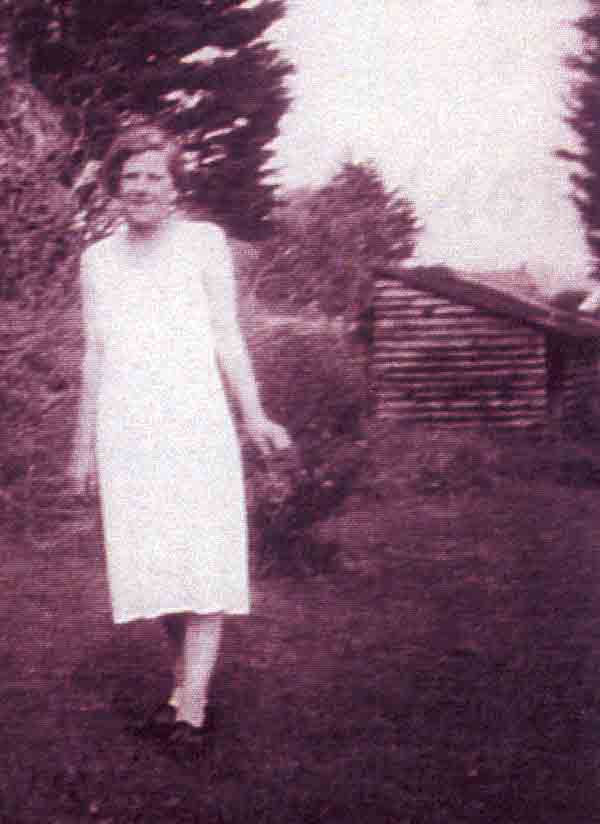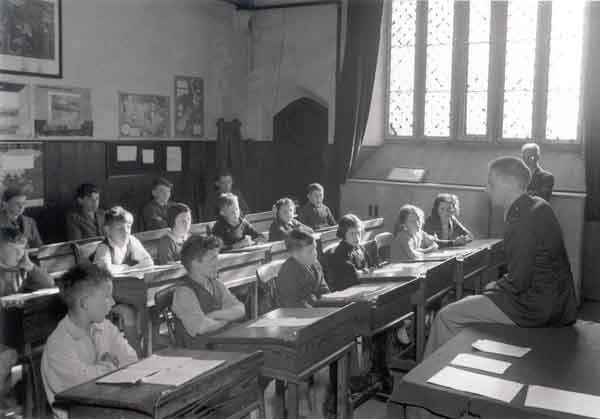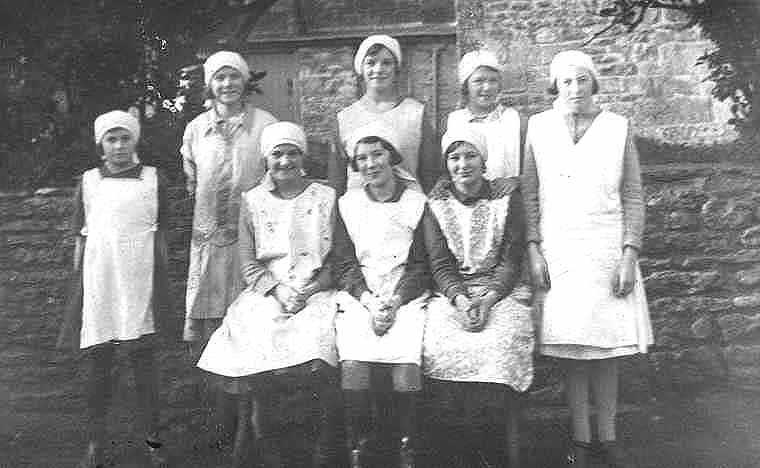An article specially written by Elizabeth Gale
on her schoolday memories during WW II.
We are very grateful to Elizabeth for this fascinating contribution.
B
September 1939 to July 1944
"We are at war with
In the Infants' classroom, we sat at low tables, in twos, our exercise books and pencils stowed away in strong wooden boxes with leather hinges underneath. These boxes were made by the older boys in the woodwork lessons.
Mrs. Colenso Rodford, née Marsh, a local woman, was the Infants' teacher. She was a good, interesting teacher, strict and a little inquisitive.
 Mrs. Rodford - Infants' teacher (photo courtesy of Allan Rodway)
Mrs. Rodford - Infants' teacher (photo courtesy of Allan Rodway)
We started the day with prayers. "Hands together and eyes closed", said our
teacher. Our lessons consisted of the three Rs, (which
were driven into us), religious knowledge and drill every day. We did physical
exercises, ran around with beanbags, skipped, played with hoops and had team
races. We wore coloured braids across our chests to show which team we were
in. The playground was rough and in places, covered with clinkers from the gas
works. We learnt the Times Tables and The Lord's Prayer.
There was time for 'hand-work' when, with small, blunt scissors, we cut out boats and bowls of oranges, drawing, painting, knitting (even the boys did it), sewing and wool sorting. I hated Friday afternoons when it was wool sorting. All colours and shades had to be sorted into the correct piles. Now I can boast a good memory for colours. We had 'object lessons'. This consisted of talking, reading and writing about a certain object such as a windmill. Object lessons were as old as the school itself. My grandfather (1860s) and my father (1890s), had them as well.
When the evacuees came, in 1939/40, we had our lessons in the mornings. They, with their own teachers, worked in the afternoons. I remember we went for Nature Walks some afternoons, and Mrs. Rodford threw apples, brought from her garden, for us to catch.
We were immunised against diphtheria, and the school Medical Officer, with a nit nurse, came regularly and examined everyone in the school, as did the dreaded dentist.
Photo: From US army material taken in the war. Courtesy of the Imperial War Museum & Bridport Museum

Lt. Walker, a U.S. Army Officer, whose brother was principal of a school, gives a talk on the USA to the more senior children at Burton Bradstock School.
(L to R) Back row : Elizabeth Buckler - John Riggs (evacuee) - Bernard Thorner - Tony Legg
Centre row: Jimmy Churchill - Andrew Collins - Enid Price - Bobby Cammell - June Downton - Gordon Legg
Front row: Fred Kerley - David Kerley - Ben Bryant - Pamela Darby - Alice Legge - ?Unknown? -
Headmaster, Mr. Robert Howarth (standing)
As it was wartime, we carried our gasmasks all the time in cardboard boxes slung over our shoulders. Sometimes there was an air raid drill. As a little girl, I did not realise that it was only a practice, and I was so worried as to whether my parents were alright. The windows of the school were stuck over with crisscross tape in case they shattered if there was a bomb (see photo above).
I moved into the Juniors, early, at the age of six, and I sat at a double desk, beside Andrew Collins. We had School Inspections a couple of times. I remember writing out The Lord's Prayer for one of them.
We did
mental arithmetic and spelling tests every week. There was singing and Country
Dancing, with Mrs. Rodford
at the piano. The Senior girls were instructed in cookery
and domestic crafts, by Mrs. Howarth, in her home
or the WI Hall. The 'big' boys went to the School gardens in

Cookery Class C1934
Back row, L to R: - ??? -, Lilly Brine, Irene Coombs, Dorothy Collins, Dorothy Jones
Front row: Betty Mullins, Marjery Collins, Marjory Northover
Mr. Howarth, the Head Master, made us very aware of the war and that we had to help the war effort. We were encouraged to save each week in the National Savings' scheme and some years there was a drive in the district to collect huge sums to buy a spitfire or battleship. We all did our bit. We wore little red lapel badges to show that we were a 'cog in the wheel'.
We collected
waste paper. Alice Legge and I were about eight years
old when we teamed up to collect the paper in huge Hessian sacks. Our route
was along Southover and up over the cliff, to the
Villas. We went on Tuesdays after school in all winds and weathers. It could
often be extremely windy on the
Throughout
the years that I attended the School, we had religious instruction every day.
In the Top Class, sometimes the Vicar came to talk. We ascended the
Mr. Howarth was nearing retirement as I came to my tenth birthday when I left the School to attend the Grammar School. He often left us younger ones to our own devices at the end, whilst he took the older boys off to the gardens. We worked through our arithmetic book, did sewing, and read up on history and geography, overlooked by the teacher through the partition in the next room.
For my last term, in the summer of 1944, a completely new style
of teacher came from
Prior to their embarkation for the Normandy Beaches, the American soldiers visited
the school and took photographs, which were sent back to the
I was very happy at
School days are always memorable for one reason or another. For me the happenings of the war and how it affected us, remain with me vividly, to this day.
A year later, in 1945, I watched my parents with other, happy adults, dancing the 'Four Handed Reel', in the road outside the village school, when peace was declared.
© Elizabeth Gale, néeBuckler.
09/03/2004
written for use on the Burton Bradstock
Website.